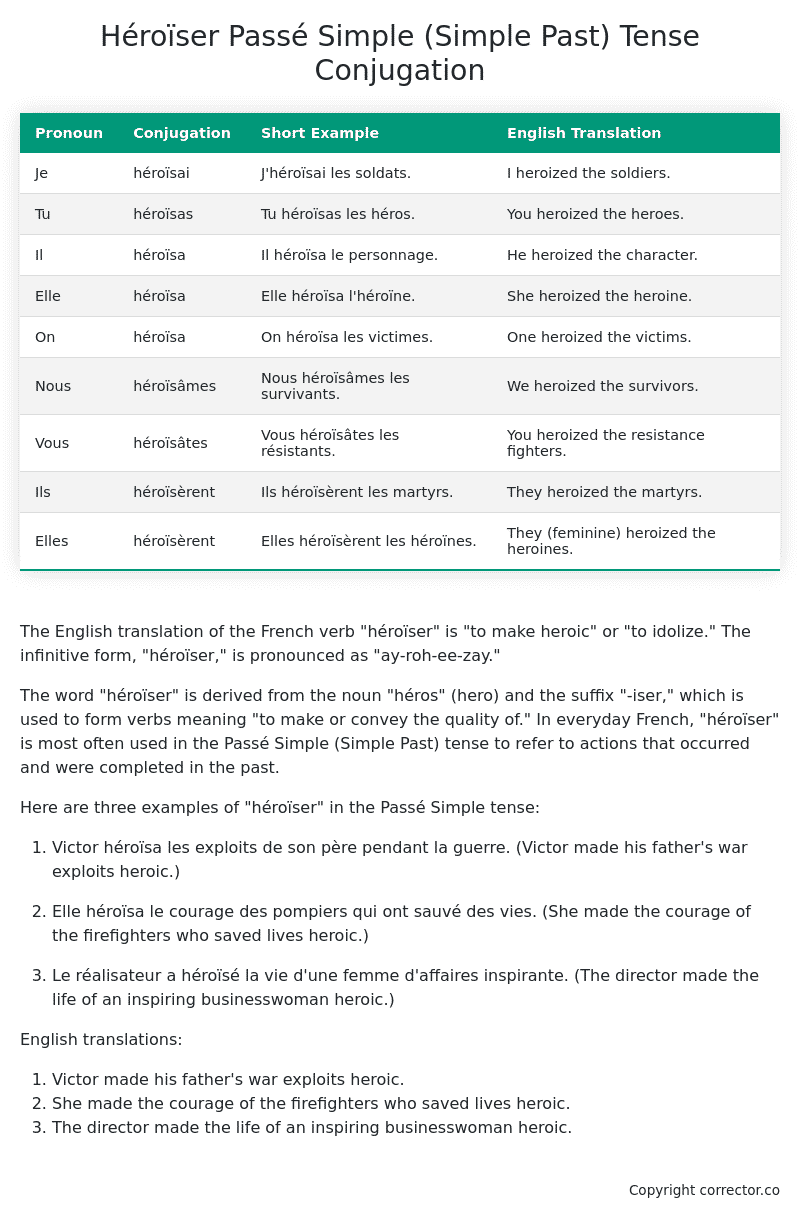Passé Simple (Simple Past) Tense Conjugation of the French Verb héroïser
Introduction to the verb héroïser
The English translation of the French verb “héroïser” is “to make heroic” or “to idolize.” The infinitive form, “héroïser,” is pronounced as “ay-roh-ee-zay.”
The word “héroïser” is derived from the noun “héros” (hero) and the suffix “-iser,” which is used to form verbs meaning “to make or convey the quality of.” In everyday French, “héroïser” is most often used in the Passé Simple (Simple Past) tense to refer to actions that occurred and were completed in the past.
Here are three examples of “héroïser” in the Passé Simple tense:
-
Victor héroïsa les exploits de son père pendant la guerre.
(Victor made his father’s war exploits heroic.) -
Elle héroïsa le courage des pompiers qui ont sauvé des vies.
(She made the courage of the firefighters who saved lives heroic.) -
Le réalisateur a héroïsé la vie d’une femme d’affaires inspirante.
(The director made the life of an inspiring businesswoman heroic.)
English translations:
- Victor made his father’s war exploits heroic.
- She made the courage of the firefighters who saved lives heroic.
- The director made the life of an inspiring businesswoman heroic.
Table of the Passé Simple (Simple Past) Tense Conjugation of héroïser
| Pronoun | Conjugation | Short Example | English Translation |
|---|---|---|---|
| Je | héroïsai | J’héroïsai les soldats. | I heroized the soldiers. |
| Tu | héroïsas | Tu héroïsas les héros. | You heroized the heroes. |
| Il | héroïsa | Il héroïsa le personnage. | He heroized the character. |
| Elle | héroïsa | Elle héroïsa l’héroïne. | She heroized the heroine. |
| On | héroïsa | On héroïsa les victimes. | One heroized the victims. |
| Nous | héroïsâmes | Nous héroïsâmes les survivants. | We heroized the survivors. |
| Vous | héroïsâtes | Vous héroïsâtes les résistants. | You heroized the resistance fighters. |
| Ils | héroïsèrent | Ils héroïsèrent les martyrs. | They heroized the martyrs. |
| Elles | héroïsèrent | Elles héroïsèrent les héroïnes. | They (feminine) heroized the heroines. |
Other Conjugations for Héroïser.
Le Present (Present Tense) Conjugation of the French Verb héroïser
Imparfait (Imperfect) Tense Conjugation of the French Verb héroïser
Passé Simple (Simple Past) Tense Conjugation of the French Verb héroïser (You’re reading it right now!)
Passé Composé (Present Perfect) Tense Conjugation of the French Verb héroïser
Futur Simple (Simple Future) Tense Conjugation of the French Verb héroïser
Futur Proche (Near Future) Tense Conjugation of the French Verb héroïser
Plus-que-parfait (Pluperfect) Tense Conjugation of the French Verb héroïser
Passé Antérieur (Past Anterior) Tense Conjugation of the French Verb héroïser
Futur Antérieur (Future Anterior) Tense Conjugation of the French Verb héroïser
Subjonctif Présent (Subjunctive Present) Tense Conjugation of the French Verb héroïser
Subjonctif Passé (Subjunctive Past) Tense Conjugation of the French Verb héroïser
Subjonctif Imparfait (Subjunctive Imperfect) Tense Conjugation of the French Verb héroïser
Subjonctif Plus-que-parfait (Subjunctive Pluperfect) Tense Conjugation of the French Verb héroïser
Conditionnel Présent (Conditional Present) Tense Conjugation of the French Verb héroïser
Conditionnel Passé (Conditional Past) Tense Conjugation of the French Verb héroïser
Conditionnel Passé II (Conditional Past II) Tense Conjugation of the French Verb héroïser
L’impératif Présent (Imperative Present) Tense Conjugation of the French Verb héroïser
L’impératif Passé (Imperative Past) Tense Conjugation of the French Verb héroïser
L’infinitif Présent (Infinitive Present) Tense Conjugation of the French Verb héroïser
L’infinitif Passé (Infinitive Past) Tense Conjugation of the French Verb héroïser
Le Participe Présent (Present Participle) Tense Conjugation of the French Verb héroïser
Le Participe Passé (Past Participle) Tense Conjugation of the French Verb héroïser
Struggling with French verbs or the language in general? Why not use our free French Grammar Checker – no registration required!
Get a FREE Download Study Sheet of this Conjugation 🔥
Simply right click the image below, click “save image” and get your free reference for the héroïser Passé Simple tense conjugation!

Héroïser – About the French Passé Simple (Simple Past) Tense
Formation
Usage
Narration
Historical Context
Interactions with other tenses
Passé Composé
Imparfait
Conditional and Subjunctive
Summary
I hope you enjoyed this article on the verb héroïser. Still in a learning mood? Check out another TOTALLY random French verb conjugation!


